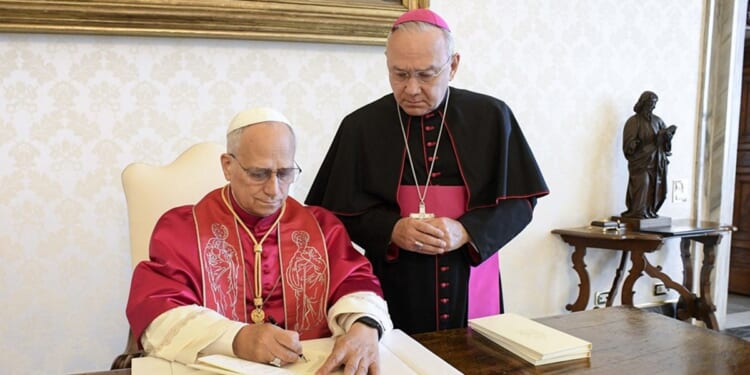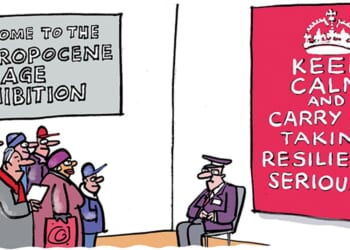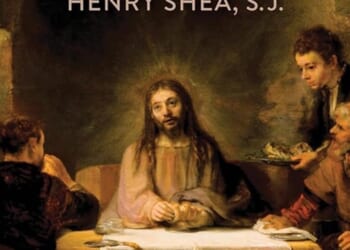THE Pope has urged Christians to rediscover the link between faith and commitment to the poor, in his first significant teaching document since taking office in May (News, 23 May).
“The condition of the poor is a cry that, throughout human history, constantly challenges our lives, societies, political and economic systems, and, not least, the Church — on the wounded faces of the poor, we see the suffering of the innocent and, therefore, the suffering of Christ himself,” the Pope says in an apostolic exhortation released on Thursday.
“There are many forms of poverty: the poverty of those who lack material means of subsistence, the poverty of those who are socially marginalised and lack the means to give voice to their dignity and abilities, moral and spiritual poverty, cultural poverty . . . the poverty of those who have no rights, no space, no freedom.”
The Pope says that the document Dilexi Te (“I have loved you”) was initiated by Pope Francis before his death in April, and has been made his own to emphasise “the close connection between Christ’s love and his summons to care for the poor”.
Growing poverty, he says, often particularly affecting women, is also a source of concern in rich countries, including those of Europe, and has been worsened by the “blindness and cruelty” of those who see poverty as “a choice”, endorsing a “specious view of meritocracy that sees only the successful as ‘deserving’”.
Christians will incur guilt if they remain unresponsive to “the cry of the poor”, the Pope says, as old forms of poverty are “joined by new ones, sometimes more subtle and dangerous”.
“The claim that the modern world has reduced poverty is made by measuring poverty with criteria from the past that do not correspond to present-day realities,” Dilexi Te continues.
“Christians too, on a number of occasions, have succumbed to attitudes shaped by secular ideologies or political and economic approaches that lead to gross generalizations and mistaken conclusions. The fact that some dismiss or ridicule charitable works, as if they were an obsession on the part of a few and not the burning heart of the Church’s mission, convinces me of the need to go back and re-read the Gospel, lest we risk replacing it with the wisdom of this world.”
The 21,500-word text, which refers to 33 saints, as well as numerous scriptural and patristic sources, is the first substantial pronouncement by Pope Leo, who will also make his first visits abroad at the end of November, to Turkey and Lebanon.
Care for the poor, it says, is a fundamental theme of the Old and New Testaments, including the writings of St Paul, as well of Church Fathers such as saints John Chrysostom, Ambrose, and Augustine.
It features throughout church history, from the early monasticism of St Basil and St Benedict and medieval orders such as the Franciscans and Dominicans, to later organisations caring for prisoners, slaves, migrants and refugees, and victims of human trafficking and sexual exploitation.
Among modern apostles to the poor, it lists the saints Charles de Foucauld and Mother Teresa of Calcutta, as well as the Belgian-born Sister Emmanuelle Cinquin (1908-2008), who worked among garbage collectors in Cairo.
It also praises “popular movements”, which are often “viewed with suspicion and even persecuted” for resisting “the structural causes of poverty and inequality” and confronting “the destructive effects of the empire of money”.
“Christian charity is liberating when it becomes incarnate — likewise, the mission of the Church, when she is faithful to her Lord, is at all times to proclaim liberation,” the apostolic exhortation says.
“In world where the poor are increasingly numerous, we paradoxically see the growth of a wealthy elite, living in a bubble of comfort and luxury, almost in another world compared to ordinary people. This means that a culture still persists — sometimes well disguised — that discards others without even realising it and tolerates with indifference that millions of people die of hunger or survive in conditions unfit for human beings”.
Building on his experience as a missionary and bishop in Peru, Pope Leo devotes a section of the document to Latin America, where, he says, the “preferential option for the poor” was developed at episcopal assemblies in Medellín, Puebla, Santo Domingo, and Aparecida, and is now “well integrated” into church teaching.
The Church’s mission of “good news to the poor”, he says, found expression at the 1962-1965 Second Vatican Council, and in later papal documents, including those of Pope Francis, who warned in Evangelii Gaudium (2013) against “an economy that kills”, driven by “ideologies that defend the absolute autonomy of the marketplace and financial speculation”.
The Pope praises an Instruction on Certain Aspects of the Theology of Liberation, issued in 1984 by the Vatican’s Congregation for the Doctrine of the Faith, which “remains timely today”, and says that “unjust structures” need to be “recognised and eradicated by the force for good” and by “changing mindsets”.
He criticises Christian groups that “show little or no interest in the common good of society” or “the protection and advancement of its most vulnerable and disadvantaged members”, and which invoke “pseudo-scientific data” to suggest that a free market economy will solve the problem of poverty.
“The dignity of every human person must be respected today, not tomorrow, and the extreme poverty of all those to whom this dignity is denied should constantly weigh upon our consciences. . . Either we regain our moral and spiritual dignity or we fall into a cesspool,” Pope Leo writes.
“Christian love breaks down every barrier, brings close those who were distant, unites strangers and reconciles enemies. . . A Church that sets no limits to love, that knows no enemies to fight but only men and women to love, is the Church that the world needs today.”
The document’s apparent commendation of aspects of liberation theology, and favourable quotations from papal encyclicals seen as left-leaning, including Paul VI’s Populorum Progressio (1967), John Paul II’s Sollicitudo Rei Socialis (1987), and Benedict XVI’s Caritas in Veritate (2009), may cause conflict with some conservative Roman Catholics, as well as with governments committed to vigorous free market economies.

















